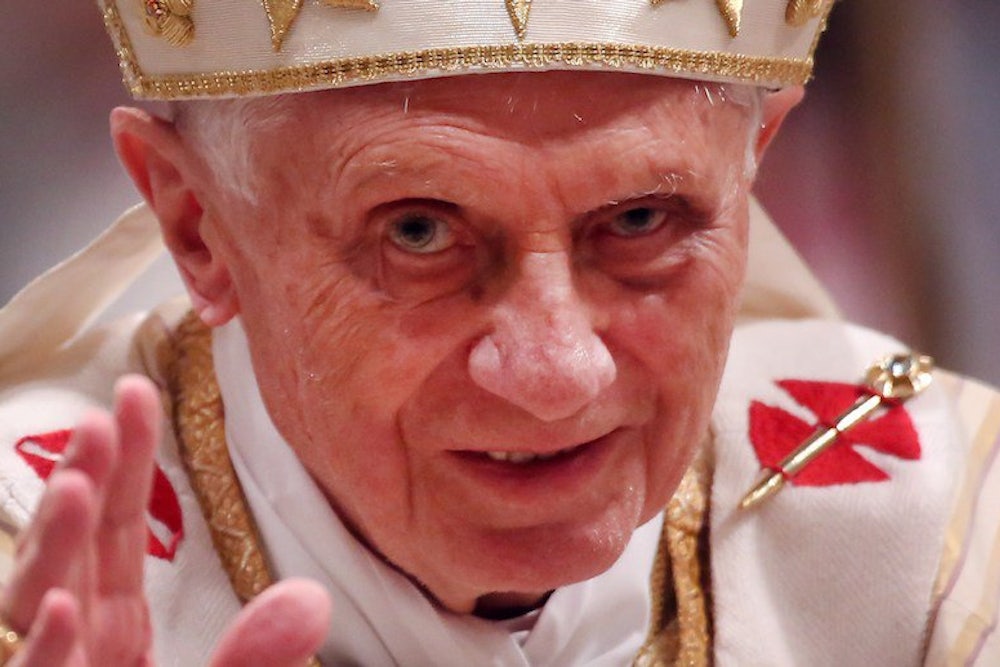Pope Benedict XVI's announcement that he's resigning the papacy this month stunned the Catholic world. Already, speculation about his successor has begun in the media and, more importantly, among the 118 cardinals who have a vote in the forthcoming conclave. Those cardinals will begin their search for a new pope by making an assessment of the existing one. With that in mind, let's consider Benedict's legacy here in the United States, where he's often seen as a doctrinaire conservative, clamping down on dissent and yearning for more traditional liturgical styles. That analysis isn't wrong, just incomplete: It leaves out the the pope's progressive politics.
One of the most dominant themes in Benedict's teaching, especially in the wake of the economic meltdown of 2008, is a deep suspicion of modern capitalism. In his World Day of Peace Message six weeks ago, Benedict wrote, "It is alarming to see hotbeds of tension and conflict caused by growing instances of inequality between rich and poor, by the prevalence of a selfish and individualistic mindset which also finds expression in an unregulated financial capitalism. In addition to the varied forms of terrorism and international crime, peace is also endangered by those forms of fundamentalism and fanaticism which distort the true nature of religion, which is called to foster fellowship and reconciliation among people."
Imagine, for a moment, the outcry if President Barack Obama had lumped "unregulated financial capitalism" with "terrorism" and "international crime" in the same paragraph as threats to world peace! But because many of Pope Benedict's American fans do not share his clear, unequivocal suspicion of markets, these teachings tend to be ignored. (They are also ignored, unfortunately, by many people in America who are suspicious of both the Church and capitalism.) In the wider Catholic universe, which is growing exponentially throughout the developing world, these teachings garner more attention.
In another mark of his distance from what Americans consider conservative orthodoxy, Benedict has earned the title of "Green Pope." He is the first pontiff to articulate a clear theology surrounding the moral obligation to care for the environment, and to link that teaching to the Church's traditional concern for the poor. In an environmental catastrophe, the poor are usually hit the hardest. Many make light of the Vatican becoming a "carbon neutral" state, seeing it as mere symbolism. Of course, Catholics do not ever qualify the noun "symbolism" with the adjective "mere."
Evidence of Benedict's conservatism tended to emerge most clearly in his intra-ecclesial decisions. He has repeatedly spoken and acted on the belief that his principal task is to ensure the unity of the Church. For those outside the fold, such as the traditionalist Lefebvrists and conservative Anglicans, he has bent over backward to invite them back into the Church, opening negotiations with the Lefebvrists and creating a new "ordinariate" or jurisdiction that allows former Anglicans to maintain some of their liturgical texts, such the Book of Common Prayer, while reuniting with the Catholic Church.
Conversely, he has not been shy about reining in those within the fold whom he thinks are in danger of spinning out of control. His investigation of the Leadership Conference of Women Religious, and his disciplining of priests who advocate the ordination of women evidence his efforts to keep Catholics within the bounds of what he considers orthodoxy. The seemingly disparate treatment of conservatives and progressive has resulted in some believing his decisions are ideologically driven, but he does not see it that way. Those in danger of leaving must be warned. Those who want to return should be welcomed.
A pope not only issues encyclicals and teaches the Church, but is also responsible for personnel appointments to the upper ranks of the hierarchy. Overall, Benedict's appointments have been sound. He appointed a relatively moderate American, Cardinal William Levada, to take his old job as prefect for the Congregation for the Doctrine of the Faith, the office charged with enforcing orthodoxy. His first major appointment within the U.S. was to make Bishop Donald Wuerl the Archbishop of Washington, and later a cardinal. Wuerl has been a voice of reason and moderation within an increasingly polarized American hierarchy. Benedict also appointed the gregarious Cardinal-Archbishop of New York, Timothy Dolan, a "happy warrior" personality in the most visible role in the U.S. Church.
Still, Benedict was unable to solve the conundrum posed by Bishop Robert Finn of Kansas City-St. Joseph, Missouri. Finn was convicted of failing to report child abuse in civil court last year. Under the bishops' own rules governing the protection of children, Finn could not pass the background check required of all Sunday School teachers on account of that conviction. Yet, he remains the bishop. In Catholic theology, a bishop is married to his diocese, and the idea of a civil court verdict having any kind of automatic effect on a bishop's ecclesiastical status fills the Vatican, which has a long memory, with dread. Think Becket and Henry II. But, in this day and age, after the bishops' handling of the sex abuse crisis has inflicted greater damage on the moral authority of the Church than any external challenge, the Vatican needs to devise ways to hold bishops accountable. Benedict's shortcomings in this area mean that the task will fall to his successor.
The pope's legacy, then, will mostly be his writings and his appointments. On balance, that legacy is not that of a doctrinaire conservative (as Americans understand conservatism), but of a pope who wanted to keep the Church he led focused on its core doctrines—his commitment to which led him to launch a decidedly unconservative critique of modern culture.
Michael Sean Winters writes the Distinctly Catholic blog at the National Catholic Reporter. He is a visiting fellow at Catholic University's Institute for Policy Research & Catholic Studies.
